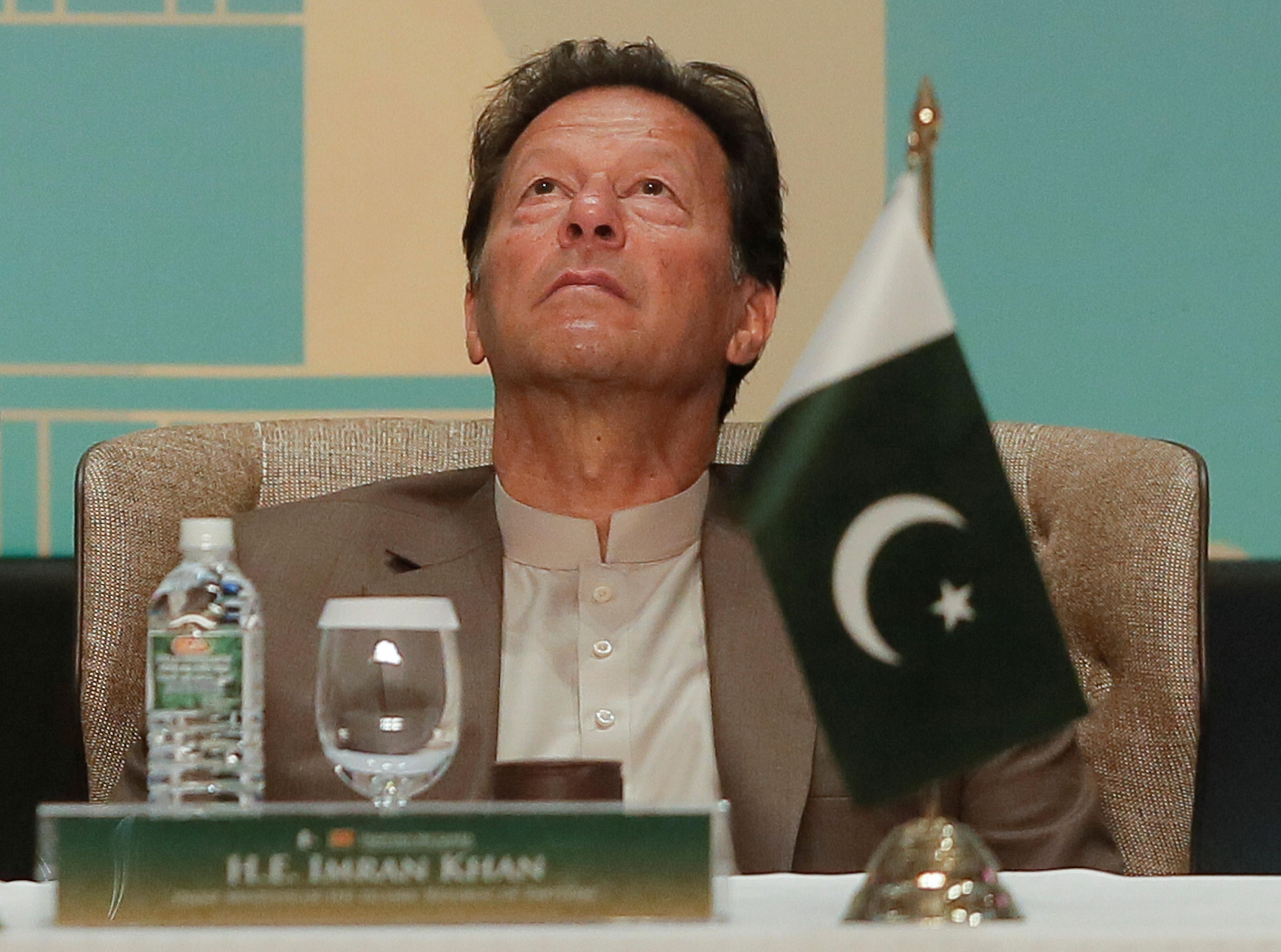It was like watching a train wreck in slow motion, but it proved thoroughly dramatic, even by Pakistani standards.
Cricketer-turned-populist firebrand Imran Khan, 69, was ousted from Pakistan’s premiership in a midnight vote by parliament on Saturday. A united opposition cast 174 votes, two more than needed to oust him. Celebrations hit the streets though weren’t widespread, but protests have erupted nationwide in favor of Khan. His party, meanwhile, announced it will resign from parliament, a move that may trigger early elections, and unrest.
None of Khan's 20 predecessors have managed to finish a term as prime minister. Some were assassinated, imprisoned, or simply resigned, and one was executed. But none have been packed off amid a constitutional drama played out on live television.
For days, Khan tried to block the no-confidence vote by trying to make it a national security problem and claiming the US had hatched a conspiracy for regime change. He dissolved parliament, commissioned an investigation into alleged American involvement in Pakistani politics, and angled for a fresh election. But that bid was overruled by the Supreme Court, which ordered the no-confidence vote proceed.
The military pressured Khan to resign, but he refused, and the administration finally allowed the vote just before a midnight deadline. Khan didn’t face the proceedings in person, fleeing instead to his private residence in the suburban hills of Islamabad and leaving the lush official residence of the prime minister empty for its next occupant. This will likely be Shehbaz Sharif, leader of the Pakistan Muslim League (Nawaz), a center-right, pro-business party named after his elder brother, three-time PM Nawaz Sharif.
The younger Sharif, 70, has been a hands-on provincial administrator and represents Pakistan’s old guard of patronage-based politics that Khan campaigned against for years. He speaks several languages, is an ardent swimmer, and is considered a political pragmatist, a trait that might help him survive the stormy, interventionist waters of the omnipresent “deep state” that is the Pakistani military. But he has no experience at the federal level.
Sharif has his work cut out for him. As he puts together a broad coalition of liberal, nationalist, and religious parties to rule Pakistan until the next election, the world’s 33rd-largest country — nuclear-armed, debt-ridden, terror-plagued, and inflation-infested — is in one of the world’s roughest neighborhoods. Pakistan shares long borders with Afghanistan, India, and Iran, and has uneasy relationships with all three. Meanwhile, it shares only a short boundary with its only ally, China, and now needs to reset its ties with its estranged partner, the United States.
Even before Khan’s allegations, bilateral relations between Washington and Islamabad had suffered, especially after the return of the Islamabad-backed Taliban regime in Afghanistan.
“The departure of US forces from Afghanistan left US-Pakistan relations with no anchor because Washington has long viewed US relations with Pakistan through an Afghanistan lens,” said Michael Kugelman, senior associate for South Asia at the Wilson Center. “With Afghanistan in the rearview mirror, US-Pakistan ties had found themselves unsettled and adrift.”
For decades, Pakistan played a balancing act between its Cold War-era partner, the US, and its “iron brother,” China. But Islamabad’s constant hedging in Afghanistan – siding with the US for diplomatic and defense support while aiding the Taliban to exert strategic influence in the war-torn country – prompted Washington to cool its ties with the Islamic Republic. Within a decade, it went from being a major non-NATO ally during the George W. Bush administration to near-pariah status during the Obama years, which were highlighted by the killing of Osama bin Laden on its mainland in 2011. As American military hardware and funding were pulled, China stepped in, filling Pakistan’s security and economic gaps in the 2010s.
But now, Pakistan’s westernized military elite is angling for a reset with Washington. In stark contrast to Khan, the powerful army chief Gen. Qamar Javed Bajwa, a graduate of American and Canadian military colleges, has signaled his pro-Washington intentions by condemning Russia, proposing interconnectedness with India, and not relying solely on China.
To reset with America, “Pakistan’s military and intelligence service seem prepared for a transactional relationship that fulfills each side’s interests,” said Husain Haqqani, a former Pakistani ambassador to Washington who now serves as director for South & Central Asia at the Hudson Institute.
These signals should send a clear message to Sharif, who understands that foreign policy has long been the purview of Pakistan’s generals, not prime ministers. Khan tried to change that and failed, so Sharif will know to stay in his lane. Grasping the country’s unwieldy economic reins will be tough enough, and he knows what he’s up against: On the eve of Khan’s ouster, as the stock market crashed and perpetually broke Pakistan awaited a new arrangement with the IMF, Sharif tweeted that “Markets abhor instability,” but he has thus far refrained from making policy announcements.
But even if Sharif sticks to the rules – leaving diplomacy to the brass – both he and the generals will struggle because Khan’s anti-US rhetoric has created another problem. “Now, a Pakistani civilian government that tries to improve ties with the U.S. runs the risk of being accused in Pakistan of being American agents,” warned Haqqani, who himself was once targeted by the Pakistani military with unproven treason charges for his proximity to Washington.
But Pakistan’s leaders still have to move forward. “Realism requires you to pick up the pieces and start rebuilding,” said former foreign minister Hina Rabbani Khar, who is in the running to become the next top diplomat of the country. With the US, “we have had reduced bandwidth since the Afghanistan departure … so really it [is] time to see how to take the bilateral relations forward in a win-win way,” she explained.
Reducing tensions in foreign affairs generally, Khar added, would give Pakistan “the chance to strengthen internally rather than be bogged down with managing confrontational relations.”
